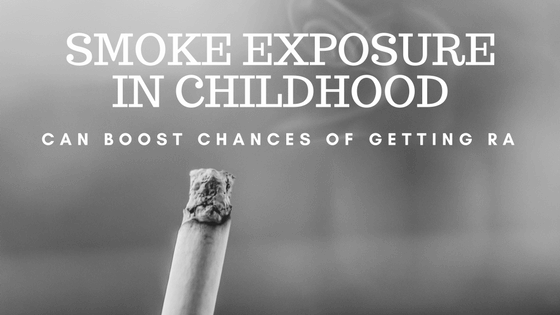Each year The European League Against Rheumatism (EULAR), an organization that represents the patient, healthcare professional and professional societies of rheumatology in the European Union, holds the Annual European Congress of Rheumatology. Not only does this forum serve as a space where rheumatology professionals can connect with patient organizations from all across Europe, but is also helps rheumatologists engage with other professionals and learn about new findings in the field.
If you recall my previous blog, Medicines May Help to Prevent Arthritis, EULAR may sound familiar to you because this blog was based on a report from this forum as well. As a follow-up to my previous blog, I’d also like to talk about another interesting finding that was presented at the conference: secondhand smoke exposure from cigarettes in childhood can boost chances of getting rheumatoid arthritis (RA).
“This is the first demonstration of a rheumatoid arthritis risk associated with passive smoking,” explained Raphaèle Seror, M.D., a professor of rheumatology at the University of Paris–South and a practicing rheumatologist at the Hospital Bicetre Kremlin Bicetre, at the European Congress of Rheumatology.
The French rheumatologist and her team analyzed data collected from more than 70,000 French women, which followed their health for more than 20 years. Then, the team identified a cohort of women who had confirmed RA based on their self-report of having incident RA, which occurs after a health-depleting action such as excessive alcohol consumption or smoking, during a follow-up study.
This cohort of women who had confirmed incident RA totaled 389 women. Majority of those women had a history of smoking or being exposed to secondhand smoke. In fact, the analysis showed that women who had a history of second-hand smoke were exposed to it as children — and they were all exposed at an estimated more than an hour every day. These women actually showed to have a 43% higher rate of incident RA compared to women who never smoked or never had a history of secondhand smoke exposure.
To further confirm the suspicions of the link between smoking and RA incidence, 37% of women with a history of smoking without childhood exposure had the likelihood of developing RA, and 73% of women who had both secondhand smoke exposure as children and smoked into adulthood were likely to develop RA.
Although this study only analyzed women, it can be evident that we can say the same for men as well. Regardless, “secondhand smoke exposure to children was about as potent a trigger for future rheumatoid arthritis as active smoking by an adult,” says a report from Rheumatology News.
Were you frequently exposed to secondhand smoke as a child? Do you smoke today? It’s probably a good idea to make an appointment with your local rheumatologist to get yourself checked for RA.
